Analysis of IFRS and Conceptual Framework's Impact on Reporting
VerifiedAdded on 2019/10/18
|8
|1313
|164
Report
AI Summary
This report provides a detailed analysis of the impact of International Financial Reporting Standards (IFRS) and the conceptual framework on financial reporting. It begins with the history and background of accounting and IFRS, highlighting the transition from country-specific standards to a globally recognized framework. The report outlines the objectives of IFRS and the conceptual framework established by the IASB, emphasizing the goal of creating transparent and accurate financial statements. It also examines corporate scandals, such as Enron and Wells Fargo, to illustrate the implications of financial reporting failures before and after the implementation of IFRS. Furthermore, the report discusses IFRS's role in assisting regulators of public listed companies and its impact on financial reporting, including changes in valuation methods and the strengthening of regulatory oversight. The report concludes with a comprehensive list of references, providing a solid foundation for the analysis.
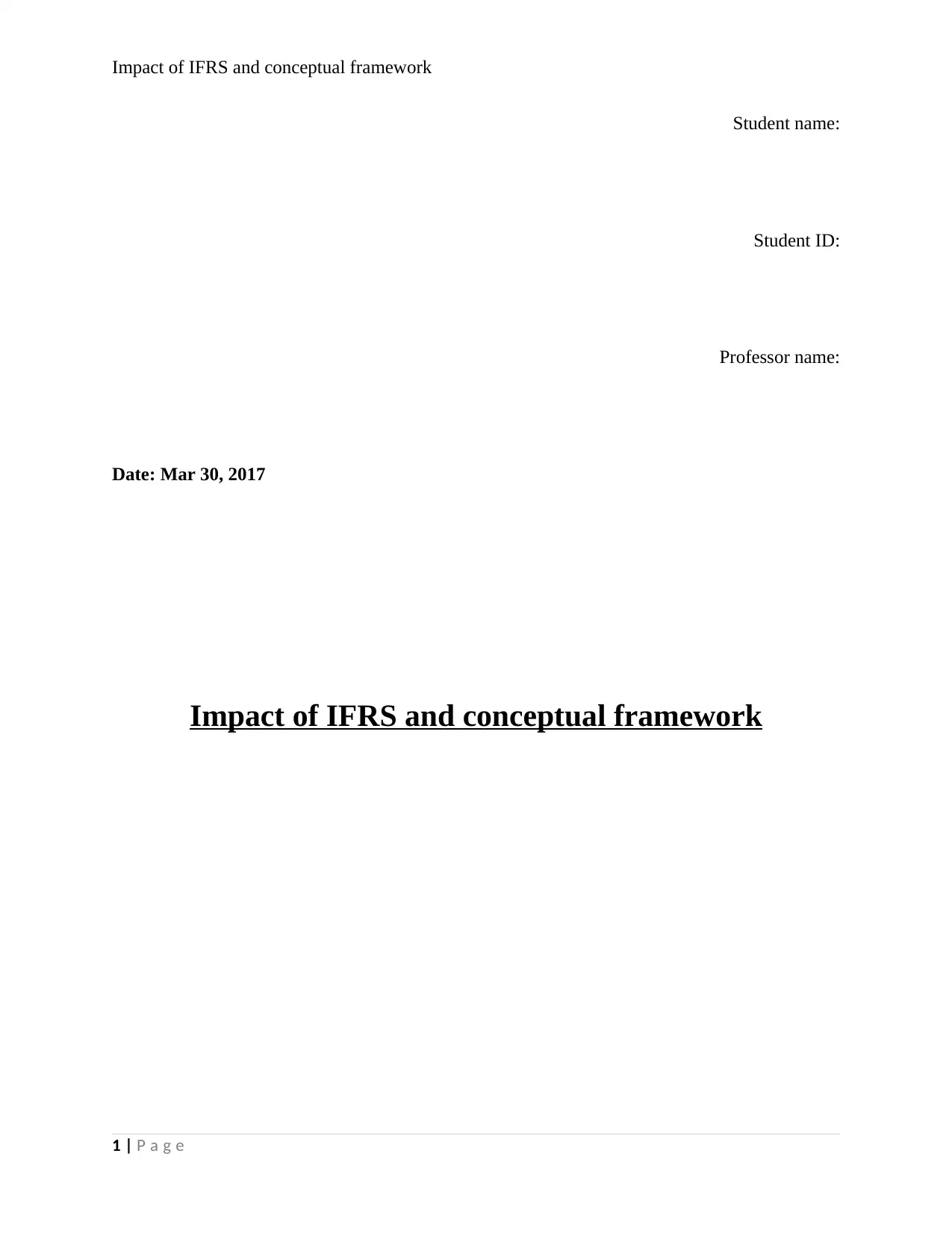
Impact of IFRS and conceptual framework
Student name:
Student ID:
Professor name:
Date: Mar 30, 2017
Impact of IFRS and conceptual framework
1 | P a g e
Student name:
Student ID:
Professor name:
Date: Mar 30, 2017
Impact of IFRS and conceptual framework
1 | P a g e
Paraphrase This Document
Need a fresh take? Get an instant paraphrase of this document with our AI Paraphraser
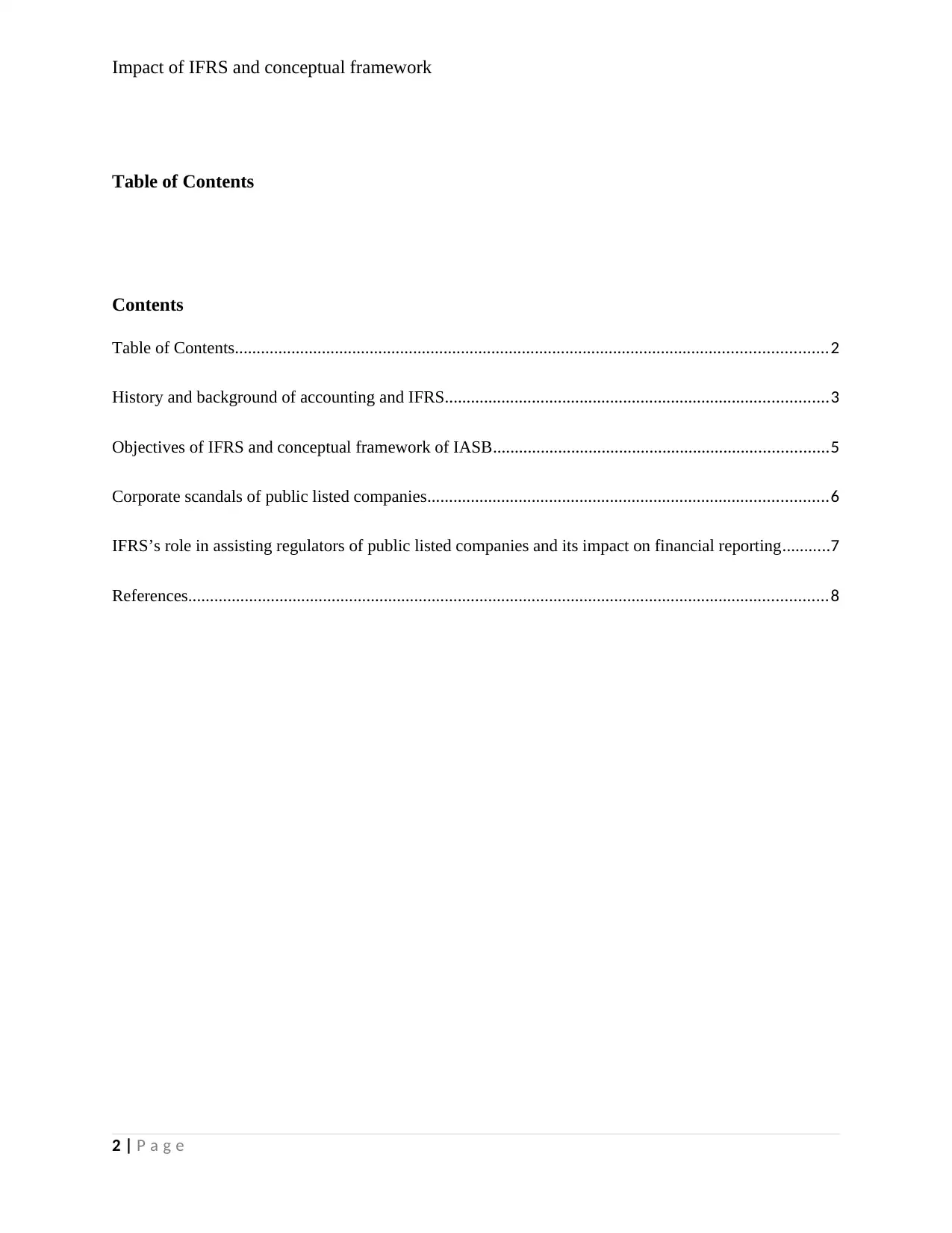
Impact of IFRS and conceptual framework
Table of Contents
Contents
Table of Contents........................................................................................................................................2
History and background of accounting and IFRS........................................................................................3
Objectives of IFRS and conceptual framework of IASB.............................................................................5
Corporate scandals of public listed companies............................................................................................6
IFRS’s role in assisting regulators of public listed companies and its impact on financial reporting...........7
References...................................................................................................................................................8
2 | P a g e
Table of Contents
Contents
Table of Contents........................................................................................................................................2
History and background of accounting and IFRS........................................................................................3
Objectives of IFRS and conceptual framework of IASB.............................................................................5
Corporate scandals of public listed companies............................................................................................6
IFRS’s role in assisting regulators of public listed companies and its impact on financial reporting...........7
References...................................................................................................................................................8
2 | P a g e
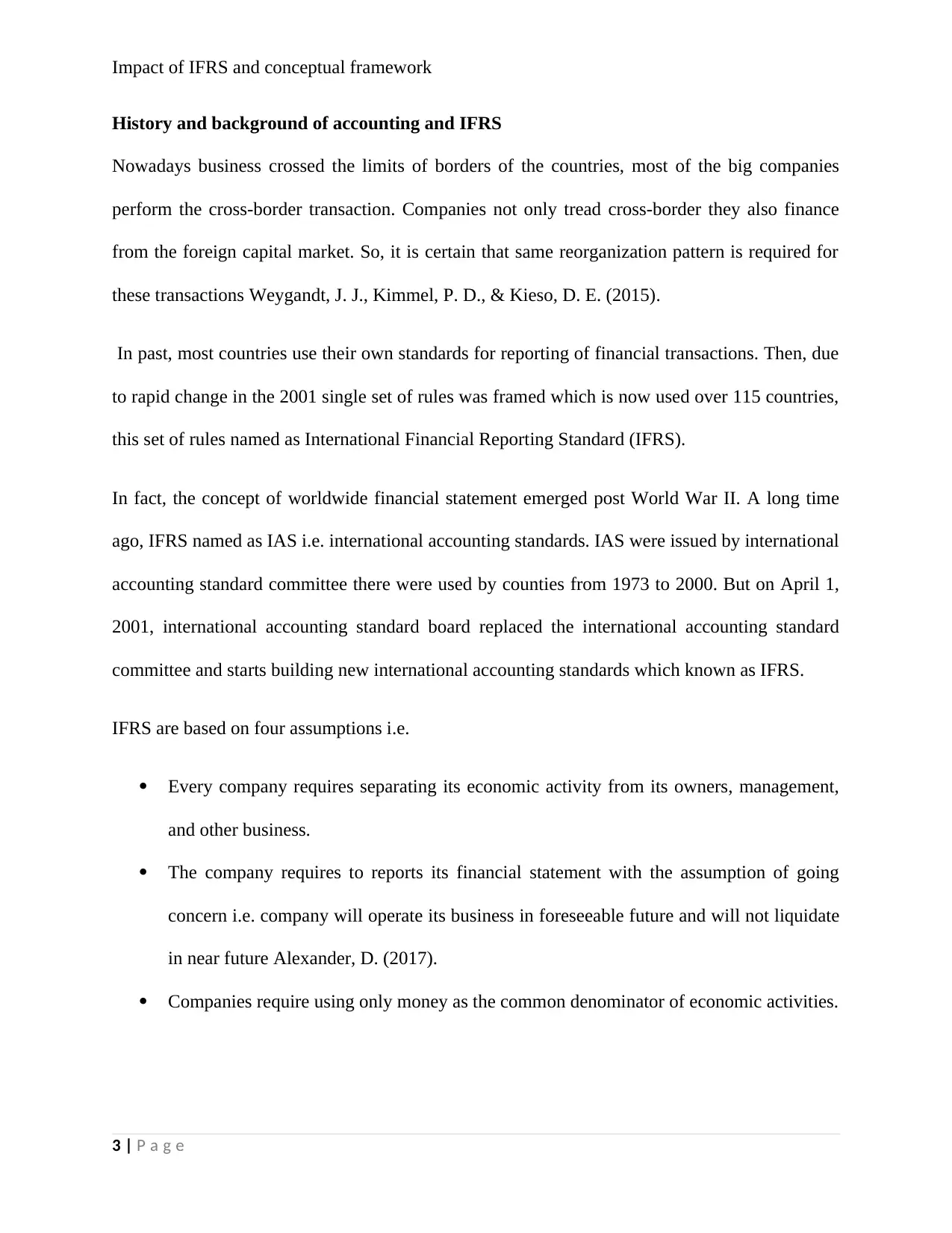
Impact of IFRS and conceptual framework
History and background of accounting and IFRS
Nowadays business crossed the limits of borders of the countries, most of the big companies
perform the cross-border transaction. Companies not only tread cross-border they also finance
from the foreign capital market. So, it is certain that same reorganization pattern is required for
these transactions Weygandt, J. J., Kimmel, P. D., & Kieso, D. E. (2015).
In past, most countries use their own standards for reporting of financial transactions. Then, due
to rapid change in the 2001 single set of rules was framed which is now used over 115 countries,
this set of rules named as International Financial Reporting Standard (IFRS).
In fact, the concept of worldwide financial statement emerged post World War II. A long time
ago, IFRS named as IAS i.e. international accounting standards. IAS were issued by international
accounting standard committee there were used by counties from 1973 to 2000. But on April 1,
2001, international accounting standard board replaced the international accounting standard
committee and starts building new international accounting standards which known as IFRS.
IFRS are based on four assumptions i.e.
Every company requires separating its economic activity from its owners, management,
and other business.
The company requires to reports its financial statement with the assumption of going
concern i.e. company will operate its business in foreseeable future and will not liquidate
in near future Alexander, D. (2017).
Companies require using only money as the common denominator of economic activities.
3 | P a g e
History and background of accounting and IFRS
Nowadays business crossed the limits of borders of the countries, most of the big companies
perform the cross-border transaction. Companies not only tread cross-border they also finance
from the foreign capital market. So, it is certain that same reorganization pattern is required for
these transactions Weygandt, J. J., Kimmel, P. D., & Kieso, D. E. (2015).
In past, most countries use their own standards for reporting of financial transactions. Then, due
to rapid change in the 2001 single set of rules was framed which is now used over 115 countries,
this set of rules named as International Financial Reporting Standard (IFRS).
In fact, the concept of worldwide financial statement emerged post World War II. A long time
ago, IFRS named as IAS i.e. international accounting standards. IAS were issued by international
accounting standard committee there were used by counties from 1973 to 2000. But on April 1,
2001, international accounting standard board replaced the international accounting standard
committee and starts building new international accounting standards which known as IFRS.
IFRS are based on four assumptions i.e.
Every company requires separating its economic activity from its owners, management,
and other business.
The company requires to reports its financial statement with the assumption of going
concern i.e. company will operate its business in foreseeable future and will not liquidate
in near future Alexander, D. (2017).
Companies require using only money as the common denominator of economic activities.
3 | P a g e
⊘ This is a preview!⊘
Do you want full access?
Subscribe today to unlock all pages.

Trusted by 1+ million students worldwide
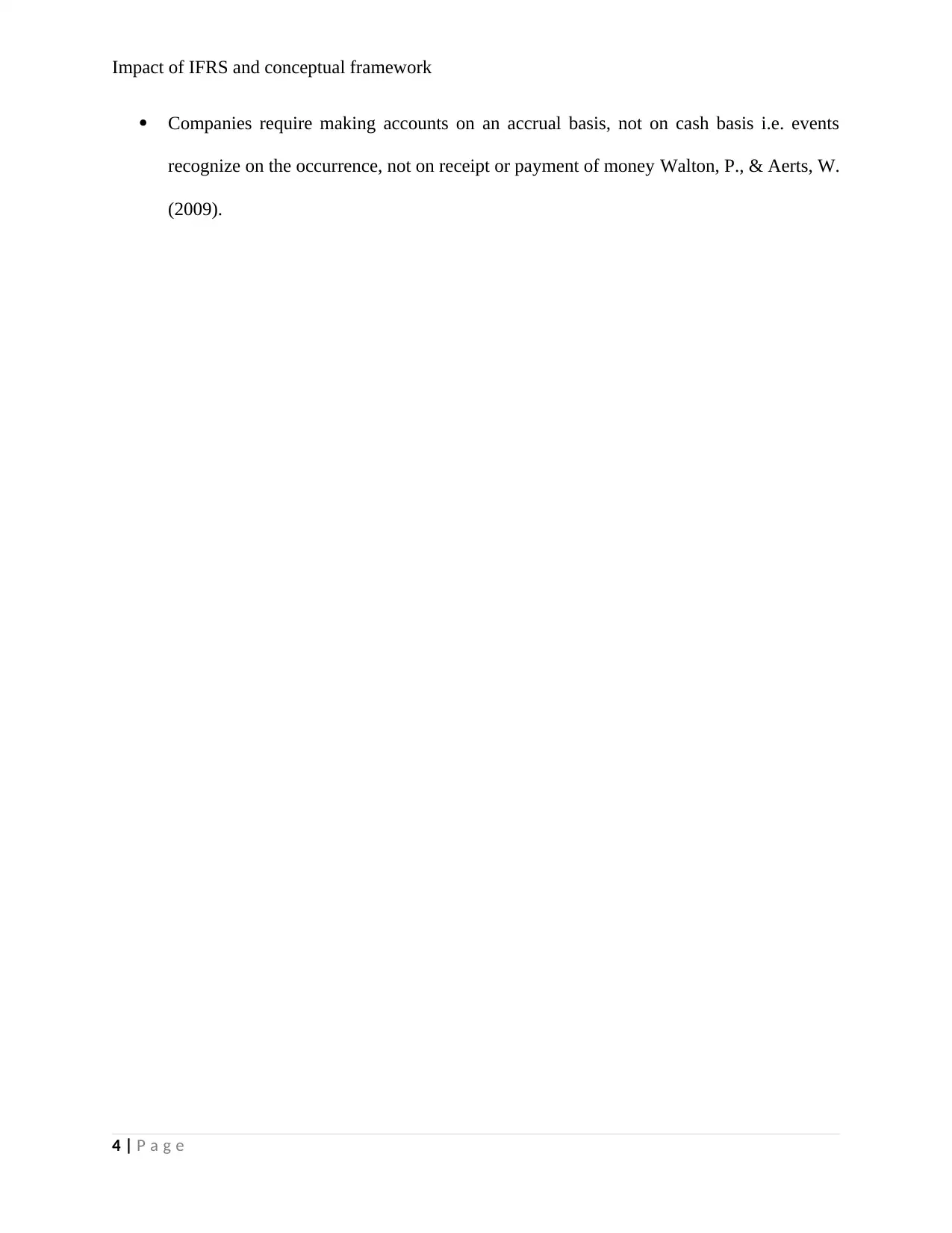
Impact of IFRS and conceptual framework
Companies require making accounts on an accrual basis, not on cash basis i.e. events
recognize on the occurrence, not on receipt or payment of money Walton, P., & Aerts, W.
(2009).
4 | P a g e
Companies require making accounts on an accrual basis, not on cash basis i.e. events
recognize on the occurrence, not on receipt or payment of money Walton, P., & Aerts, W.
(2009).
4 | P a g e
Paraphrase This Document
Need a fresh take? Get an instant paraphrase of this document with our AI Paraphraser
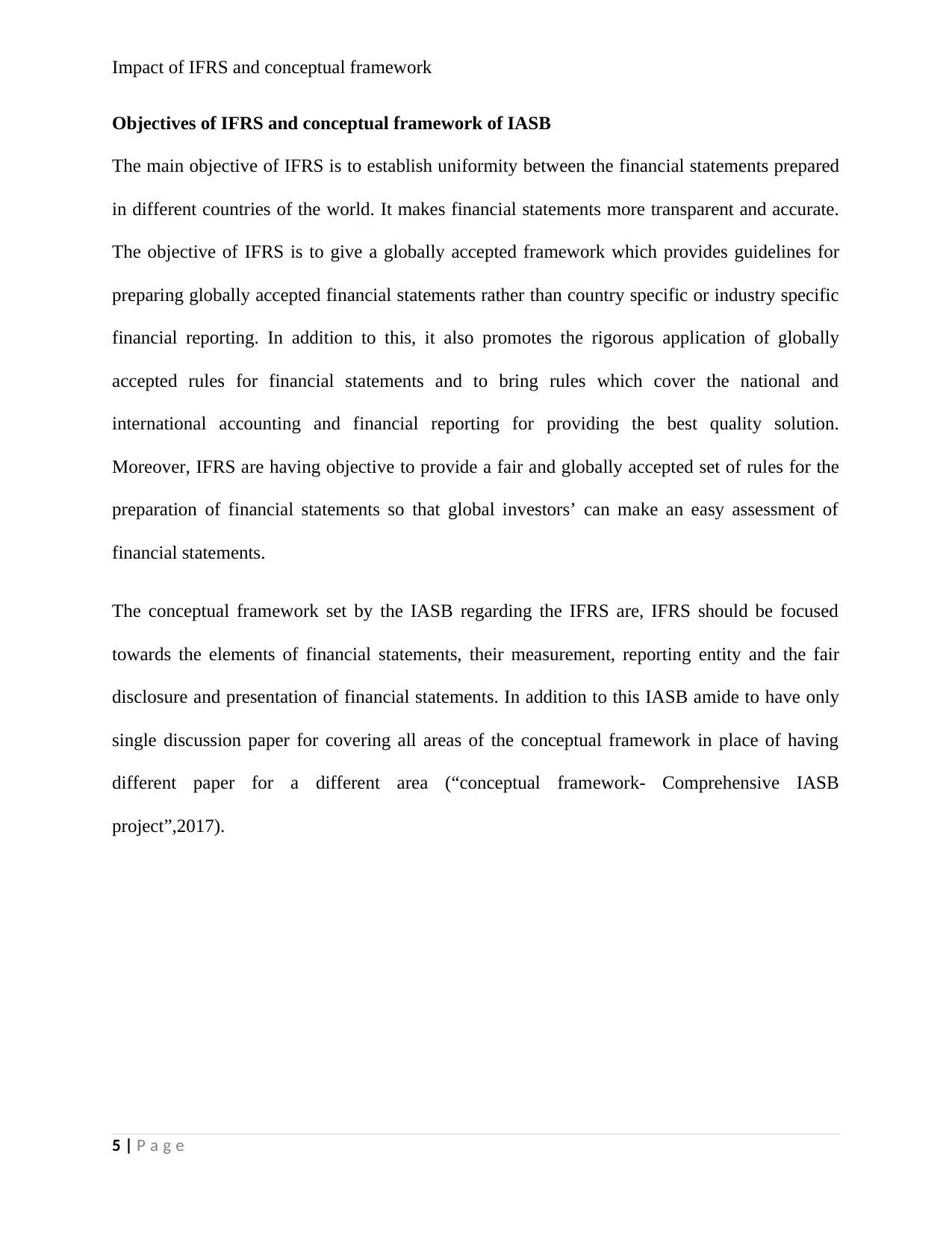
Impact of IFRS and conceptual framework
Objectives of IFRS and conceptual framework of IASB
The main objective of IFRS is to establish uniformity between the financial statements prepared
in different countries of the world. It makes financial statements more transparent and accurate.
The objective of IFRS is to give a globally accepted framework which provides guidelines for
preparing globally accepted financial statements rather than country specific or industry specific
financial reporting. In addition to this, it also promotes the rigorous application of globally
accepted rules for financial statements and to bring rules which cover the national and
international accounting and financial reporting for providing the best quality solution.
Moreover, IFRS are having objective to provide a fair and globally accepted set of rules for the
preparation of financial statements so that global investors’ can make an easy assessment of
financial statements.
The conceptual framework set by the IASB regarding the IFRS are, IFRS should be focused
towards the elements of financial statements, their measurement, reporting entity and the fair
disclosure and presentation of financial statements. In addition to this IASB amide to have only
single discussion paper for covering all areas of the conceptual framework in place of having
different paper for a different area (“conceptual framework- Comprehensive IASB
project”,2017).
5 | P a g e
Objectives of IFRS and conceptual framework of IASB
The main objective of IFRS is to establish uniformity between the financial statements prepared
in different countries of the world. It makes financial statements more transparent and accurate.
The objective of IFRS is to give a globally accepted framework which provides guidelines for
preparing globally accepted financial statements rather than country specific or industry specific
financial reporting. In addition to this, it also promotes the rigorous application of globally
accepted rules for financial statements and to bring rules which cover the national and
international accounting and financial reporting for providing the best quality solution.
Moreover, IFRS are having objective to provide a fair and globally accepted set of rules for the
preparation of financial statements so that global investors’ can make an easy assessment of
financial statements.
The conceptual framework set by the IASB regarding the IFRS are, IFRS should be focused
towards the elements of financial statements, their measurement, reporting entity and the fair
disclosure and presentation of financial statements. In addition to this IASB amide to have only
single discussion paper for covering all areas of the conceptual framework in place of having
different paper for a different area (“conceptual framework- Comprehensive IASB
project”,2017).
5 | P a g e
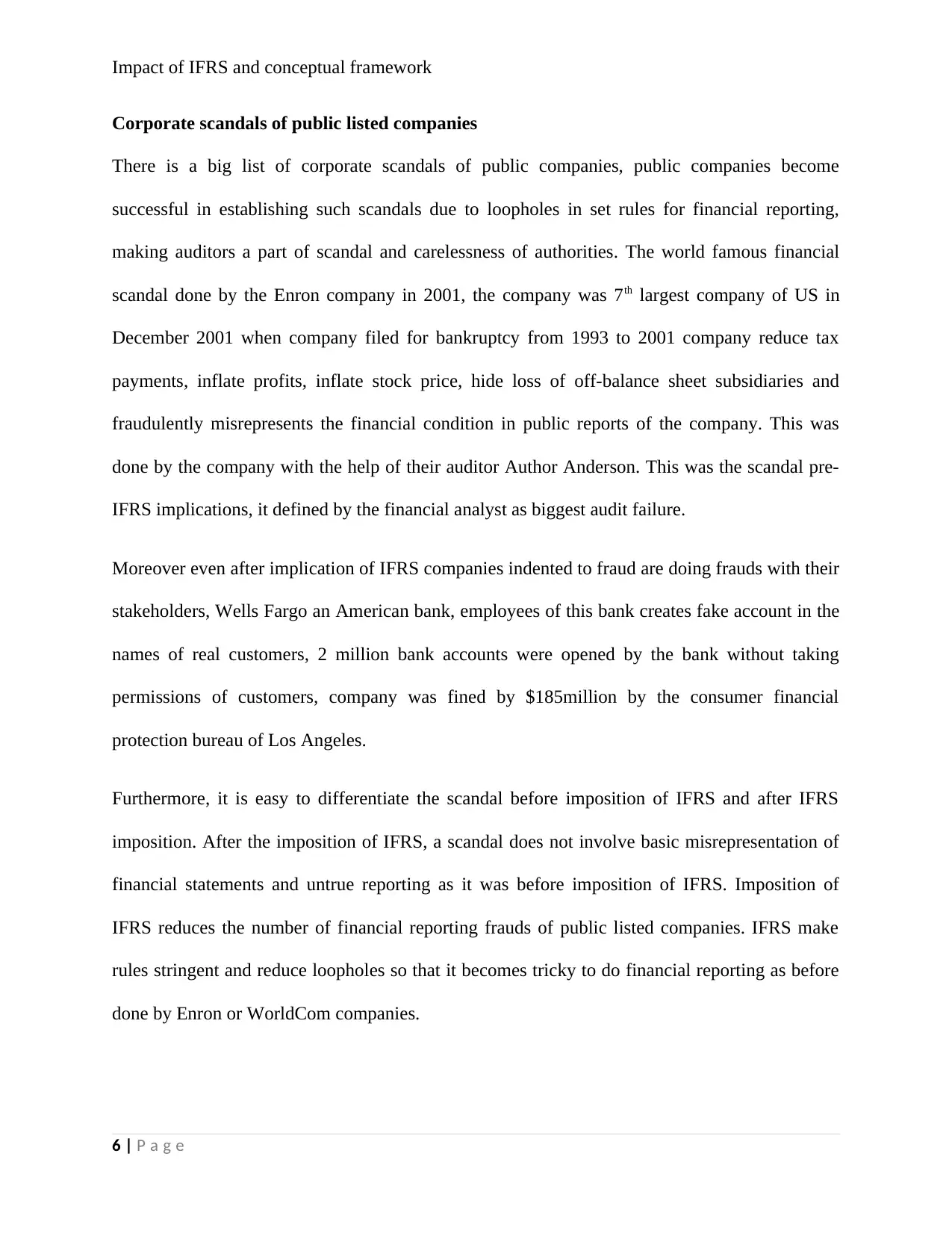
Impact of IFRS and conceptual framework
Corporate scandals of public listed companies
There is a big list of corporate scandals of public companies, public companies become
successful in establishing such scandals due to loopholes in set rules for financial reporting,
making auditors a part of scandal and carelessness of authorities. The world famous financial
scandal done by the Enron company in 2001, the company was 7th largest company of US in
December 2001 when company filed for bankruptcy from 1993 to 2001 company reduce tax
payments, inflate profits, inflate stock price, hide loss of off-balance sheet subsidiaries and
fraudulently misrepresents the financial condition in public reports of the company. This was
done by the company with the help of their auditor Author Anderson. This was the scandal pre-
IFRS implications, it defined by the financial analyst as biggest audit failure.
Moreover even after implication of IFRS companies indented to fraud are doing frauds with their
stakeholders, Wells Fargo an American bank, employees of this bank creates fake account in the
names of real customers, 2 million bank accounts were opened by the bank without taking
permissions of customers, company was fined by $185million by the consumer financial
protection bureau of Los Angeles.
Furthermore, it is easy to differentiate the scandal before imposition of IFRS and after IFRS
imposition. After the imposition of IFRS, a scandal does not involve basic misrepresentation of
financial statements and untrue reporting as it was before imposition of IFRS. Imposition of
IFRS reduces the number of financial reporting frauds of public listed companies. IFRS make
rules stringent and reduce loopholes so that it becomes tricky to do financial reporting as before
done by Enron or WorldCom companies.
6 | P a g e
Corporate scandals of public listed companies
There is a big list of corporate scandals of public companies, public companies become
successful in establishing such scandals due to loopholes in set rules for financial reporting,
making auditors a part of scandal and carelessness of authorities. The world famous financial
scandal done by the Enron company in 2001, the company was 7th largest company of US in
December 2001 when company filed for bankruptcy from 1993 to 2001 company reduce tax
payments, inflate profits, inflate stock price, hide loss of off-balance sheet subsidiaries and
fraudulently misrepresents the financial condition in public reports of the company. This was
done by the company with the help of their auditor Author Anderson. This was the scandal pre-
IFRS implications, it defined by the financial analyst as biggest audit failure.
Moreover even after implication of IFRS companies indented to fraud are doing frauds with their
stakeholders, Wells Fargo an American bank, employees of this bank creates fake account in the
names of real customers, 2 million bank accounts were opened by the bank without taking
permissions of customers, company was fined by $185million by the consumer financial
protection bureau of Los Angeles.
Furthermore, it is easy to differentiate the scandal before imposition of IFRS and after IFRS
imposition. After the imposition of IFRS, a scandal does not involve basic misrepresentation of
financial statements and untrue reporting as it was before imposition of IFRS. Imposition of
IFRS reduces the number of financial reporting frauds of public listed companies. IFRS make
rules stringent and reduce loopholes so that it becomes tricky to do financial reporting as before
done by Enron or WorldCom companies.
6 | P a g e
⊘ This is a preview!⊘
Do you want full access?
Subscribe today to unlock all pages.

Trusted by 1+ million students worldwide
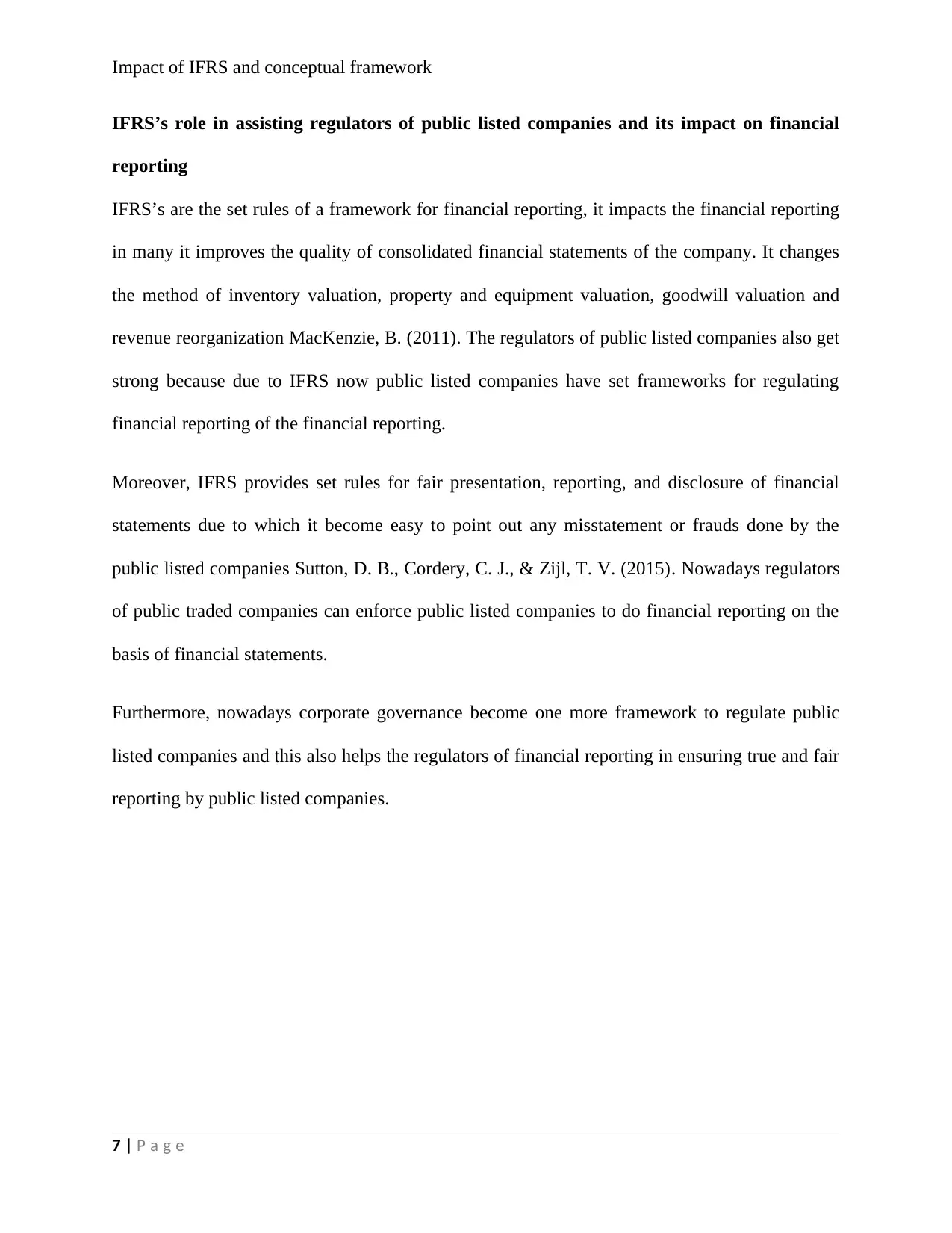
Impact of IFRS and conceptual framework
IFRS’s role in assisting regulators of public listed companies and its impact on financial
reporting
IFRS’s are the set rules of a framework for financial reporting, it impacts the financial reporting
in many it improves the quality of consolidated financial statements of the company. It changes
the method of inventory valuation, property and equipment valuation, goodwill valuation and
revenue reorganization MacKenzie, B. (2011). The regulators of public listed companies also get
strong because due to IFRS now public listed companies have set frameworks for regulating
financial reporting of the financial reporting.
Moreover, IFRS provides set rules for fair presentation, reporting, and disclosure of financial
statements due to which it become easy to point out any misstatement or frauds done by the
public listed companies Sutton, D. B., Cordery, C. J., & Zijl, T. V. (2015). Nowadays regulators
of public traded companies can enforce public listed companies to do financial reporting on the
basis of financial statements.
Furthermore, nowadays corporate governance become one more framework to regulate public
listed companies and this also helps the regulators of financial reporting in ensuring true and fair
reporting by public listed companies.
7 | P a g e
IFRS’s role in assisting regulators of public listed companies and its impact on financial
reporting
IFRS’s are the set rules of a framework for financial reporting, it impacts the financial reporting
in many it improves the quality of consolidated financial statements of the company. It changes
the method of inventory valuation, property and equipment valuation, goodwill valuation and
revenue reorganization MacKenzie, B. (2011). The regulators of public listed companies also get
strong because due to IFRS now public listed companies have set frameworks for regulating
financial reporting of the financial reporting.
Moreover, IFRS provides set rules for fair presentation, reporting, and disclosure of financial
statements due to which it become easy to point out any misstatement or frauds done by the
public listed companies Sutton, D. B., Cordery, C. J., & Zijl, T. V. (2015). Nowadays regulators
of public traded companies can enforce public listed companies to do financial reporting on the
basis of financial statements.
Furthermore, nowadays corporate governance become one more framework to regulate public
listed companies and this also helps the regulators of financial reporting in ensuring true and fair
reporting by public listed companies.
7 | P a g e
Paraphrase This Document
Need a fresh take? Get an instant paraphrase of this document with our AI Paraphraser
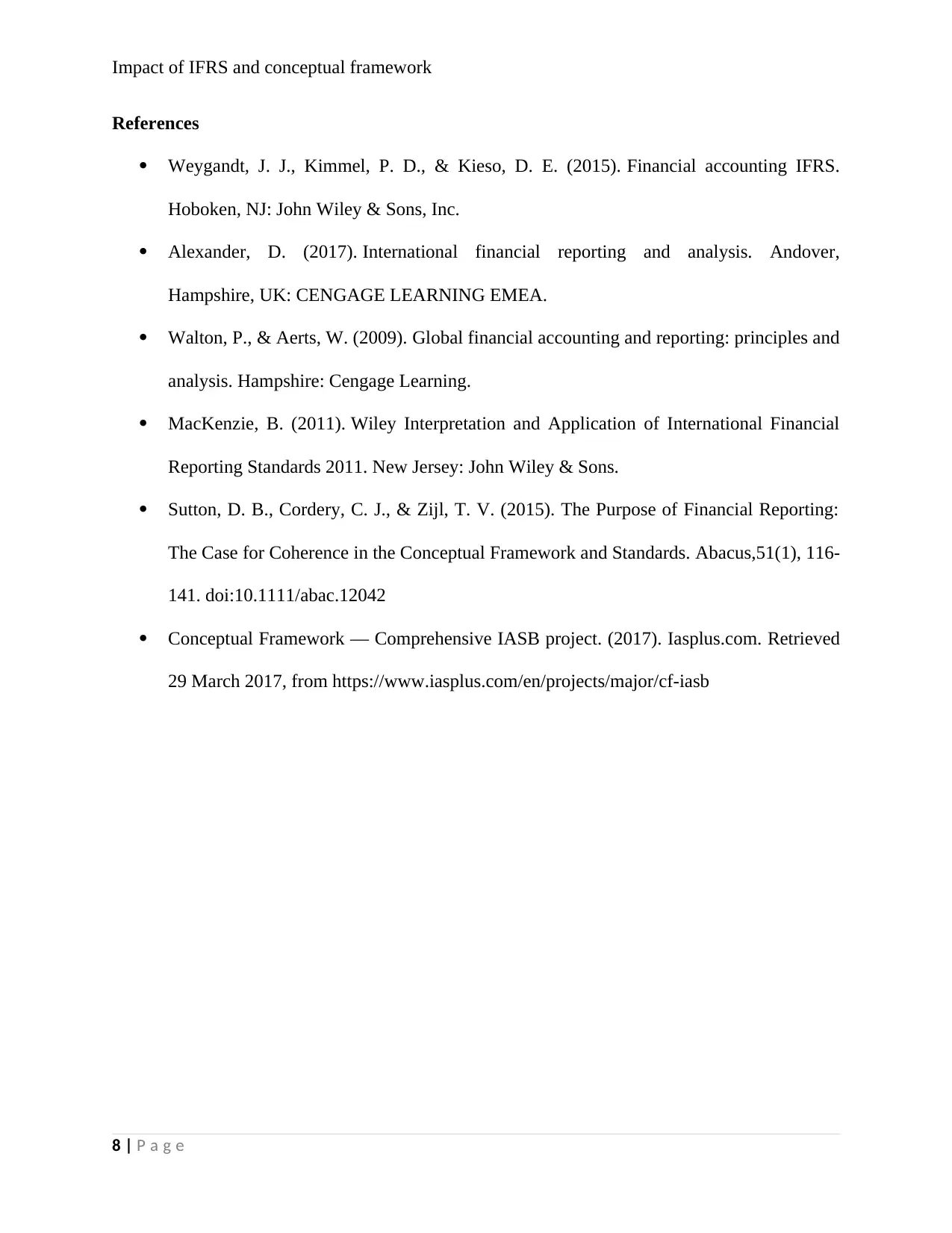
Impact of IFRS and conceptual framework
References
Weygandt, J. J., Kimmel, P. D., & Kieso, D. E. (2015). Financial accounting IFRS.
Hoboken, NJ: John Wiley & Sons, Inc.
Alexander, D. (2017). International financial reporting and analysis. Andover,
Hampshire, UK: CENGAGE LEARNING EMEA.
Walton, P., & Aerts, W. (2009). Global financial accounting and reporting: principles and
analysis. Hampshire: Cengage Learning.
MacKenzie, B. (2011). Wiley Interpretation and Application of International Financial
Reporting Standards 2011. New Jersey: John Wiley & Sons.
Sutton, D. B., Cordery, C. J., & Zijl, T. V. (2015). The Purpose of Financial Reporting:
The Case for Coherence in the Conceptual Framework and Standards. Abacus,51(1), 116-
141. doi:10.1111/abac.12042
Conceptual Framework — Comprehensive IASB project. (2017). Iasplus.com. Retrieved
29 March 2017, from https://www.iasplus.com/en/projects/major/cf-iasb
8 | P a g e
References
Weygandt, J. J., Kimmel, P. D., & Kieso, D. E. (2015). Financial accounting IFRS.
Hoboken, NJ: John Wiley & Sons, Inc.
Alexander, D. (2017). International financial reporting and analysis. Andover,
Hampshire, UK: CENGAGE LEARNING EMEA.
Walton, P., & Aerts, W. (2009). Global financial accounting and reporting: principles and
analysis. Hampshire: Cengage Learning.
MacKenzie, B. (2011). Wiley Interpretation and Application of International Financial
Reporting Standards 2011. New Jersey: John Wiley & Sons.
Sutton, D. B., Cordery, C. J., & Zijl, T. V. (2015). The Purpose of Financial Reporting:
The Case for Coherence in the Conceptual Framework and Standards. Abacus,51(1), 116-
141. doi:10.1111/abac.12042
Conceptual Framework — Comprehensive IASB project. (2017). Iasplus.com. Retrieved
29 March 2017, from https://www.iasplus.com/en/projects/major/cf-iasb
8 | P a g e
1 out of 8
Related Documents
Your All-in-One AI-Powered Toolkit for Academic Success.
+13062052269
info@desklib.com
Available 24*7 on WhatsApp / Email
![[object Object]](/_next/static/media/star-bottom.7253800d.svg)
Unlock your academic potential
Copyright © 2020–2026 A2Z Services. All Rights Reserved. Developed and managed by ZUCOL.




